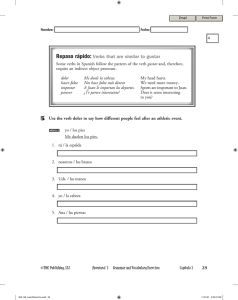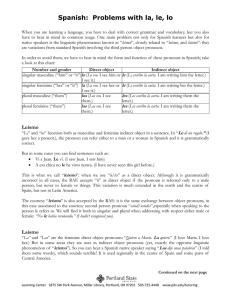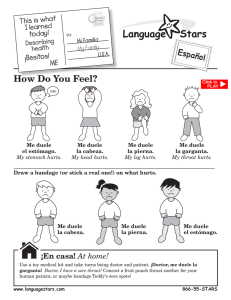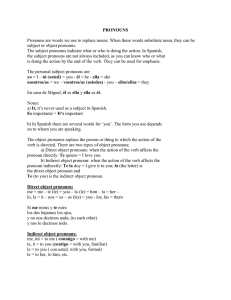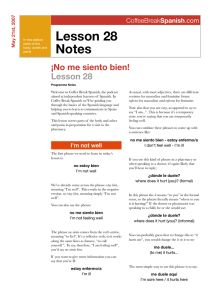Pronombres de complemento indirecto (p. 111) a
Anuncio
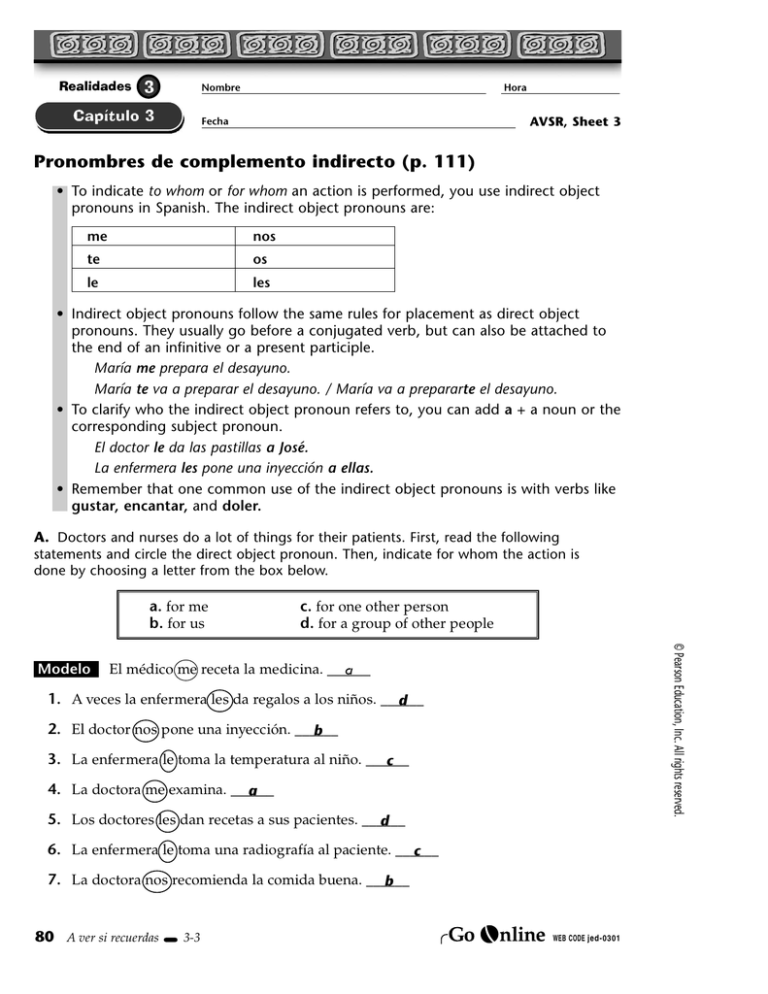
Realidades Nombre Hora AVSR, Sheet 3 Fecha Pronombres de complemento indirecto (p. 111) • To indicate to whom or for whom an action is performed, you use indirect object pronouns in Spanish. The indirect object pronouns are: me nos te os le les • Indirect object pronouns follow the same rules for placement as direct object pronouns. They usually go before a conjugated verb, but can also be attached to the end of an infinitive or a present participle. María me prepara el desayuno. María te va a preparar el desayuno. / María va a prepararte el desayuno. • To clarify who the indirect object pronoun refers to, you can add a + a noun or the corresponding subject pronoun. El doctor le da las pastillas a José. La enfermera les pone una inyección a ellas. • Remember that one common use of the indirect object pronouns is with verbs like gustar, encantar, and doler. A. Doctors and nurses do a lot of things for their patients. First, read the following statements and circle the direct object pronoun. Then, indicate for whom the action is done by choosing a letter from the box below. a. for me b. for us © Pearson Education, Inc. All rights reserved. Modelo: c. for one other person d. for a group of other people El médico me receta la medicina. ______ a 1. A veces la enfermera les da regalos a los niños. ______ d 2. El doctor nos pone una inyección. ______ b 3. La enfermera le toma la temperatura al niño. ______ c 4. La doctora me examina. ______ a 5. Los doctores les dan recetas a sus pacientes. ______ d 6. La enfermera le toma una radiografía al paciente. ______ c 7. La doctora nos recomienda la comida buena. ______ b 80 A ver si recuerdas 3-3 WEB CODE jed- 0301 Realidades Nombre Hora AVSR, Sheet 4 Fecha Pronombres de complemento indirecto (continued ) B. Write the correct indirect object pronouns to complete the sentences about what an assistant does for others in his office. Modelo: le El asistente siempre __________ prepara café al jefe. nos 1. El asistente __________ sirve café a nosotros también. me 2. El asistente __________ manda (a mí) documentos por correo electrónico. les 3. El asistente __________ trae fotocopias a los trabajadores. te 4. ¿El asistente __________ prepara los materiales para la reunión (a ti)? le 5. El asistente __________ dice la verdad a su jefe. C. Help the school nurse understand what’s wrong with each student. Using the information provided, write a sentence about each picture. Be sure to include an indirect object pronoun in each sentence. Modelo: (Ronaldo / doler / el brazo) ________________________________________________________ A Ronaldo le duele el brazo. 1. (Catrina / no gustar / medicina) © Pearson Education, Inc. All rights reserved. ________________________________________________________ A Catrina no le gusta la medicina. 2. (A mí / doler / la espalda) ________________________________________________________ A mí me duele la espalda. 3. (Las chicas / doler / la cabeza) _______________________________________________________ A las chicas les duele la cabeza. 4. (Nosotros / doler / el estómago) ________________________________________________________ A nosotros nos duele el estómago. 5. (Enrique / no gustar / la inyección) ________________________________________________________ A Enrique no le gusta la inyección. WEB CODE jed- 0301 A ver si recuerdas 3-4 81

